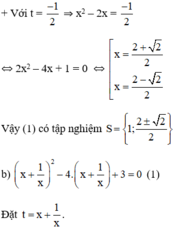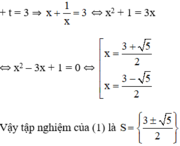3.Giải pt : 2x2 + 3x2 + 3x +1 = 0
Tuyển Cộng tác viên Hoc24 nhiệm kì 26 tại đây: https://forms.gle/dK3zGK3LHFrgvTkJ6
VN
Những câu hỏi liên quan
Giải các pt sau
a) 3x2 + 4x = 0
b) -2x2 - 8 = 0
c) 2x2 -7x2 + 5 = 0
d) x^2 - 8x - 48 = 0
cho mik hỏi rằng là 3x2 + 4x = 0 hay 3x2 + 4x = 0
Đúng 0
Bình luận (1)
ông ơi mấy bài này bấm máy tính là ra mà ông
Đúng 0
Bình luận (0)
a) \(3x^2+4x=0\Leftrightarrow\left(3x+4\right)x=0\Leftrightarrow\left[{}\begin{matrix}x=0\\3x+4=0\Leftrightarrow x=-\dfrac{4}{3}\end{matrix}\right.\)
➤\(x\in\left\{0;-\dfrac{4}{3}\right\}\)
b) \(-2x^2-8=0\Leftrightarrow-2x^2+\left(-2\right)\cdot4=0\)
\(\Leftrightarrow\left(x^2+4\right)\cdot\left(-2\right)=0\\ \Leftrightarrow x^2+4=0\\\Rightarrow x^2=\varnothing\Leftrightarrow x=\varnothing \)
vì với mọi x, ta luôn đúng với: \(x^2\ge0\Leftrightarrow x^2+4\ge4>0\)
➤\(x=\varnothing\)
c)\(2x^2-7x^2+5=0\)
+) \(a+b+c=2+\left(-7\right)+5=7-7=0\)
Do đó, phương trình có 2 nghiệm sau:
\(x=1\) và \(x=\dfrac{5}{2}=2,5\)
➤\(x\in\left\{1;2,5\right\}\)
d) \(x^2-8x-48=0\)
+)\(\Delta=\left(-8\right)^2-4\cdot1\cdot\left(-48\right)=64+192=266>0\)
\(\Leftrightarrow\sqrt{\Delta}=\sqrt{266}\)
➢Do đó, ta có: \(\left[{}\begin{matrix}x=\dfrac{\sqrt{266}-\left(-8\right)}{2\cdot2}=\dfrac{\sqrt{266}+8}{4}\\x=\dfrac{-\sqrt{266}-\left(-8\right)}{2\cdot2}=\dfrac{8-\sqrt{266}}{4}\end{matrix}\right.\)
➤ \(x\in\left\{\dfrac{8+\sqrt{266}}{4};\dfrac{8-\sqrt{266}}{4}\right\}\)
Đúng 1
Bình luận (0)
1) Tìm m để pt : -2x2 - 3x - m + 1 = 0 có 2 nghiệm âm phân biệt.
2) Tìm m để pt : -3x2 - 4x -2m + 1 = 0 có 2 nghiệm âm.
MN GIÚP E BÀI NÀY VỚI Ạ. E ĐANG CẦN GẤP Ạ.
\(1,\Leftrightarrow\left\{{}\begin{matrix}\Delta=\left(-3\right)^2-4\left(-2\right)\left(-m+1\right)>0\\x_1+x_2=\dfrac{3}{-2}< 0\\x_1x_2=\dfrac{-m+1}{-2}>0\end{matrix}\right.\\ \Leftrightarrow\left\{{}\begin{matrix}17-8m>0\\-m+1< 0\end{matrix}\right.\Leftrightarrow\left\{{}\begin{matrix}m< \dfrac{17}{8}\\m>1\end{matrix}\right.\Leftrightarrow1< m< \dfrac{17}{8}\)
\(2,\Leftrightarrow\left\{{}\begin{matrix}\Delta=\left(-4\right)^2-4\left(-3\right)\left(-2m+1\right)\ge0\\x_1+x_2=\dfrac{4}{-3}< 0\\x_1x_2=\dfrac{-2m+1}{-3}>0\end{matrix}\right.\\ \Leftrightarrow\left\{{}\begin{matrix}28-24m\ge0\\-2m+1< 0\end{matrix}\right.\Leftrightarrow\left\{{}\begin{matrix}m\le\dfrac{7}{6}\\m>\dfrac{1}{2}\end{matrix}\right.\Leftrightarrow\dfrac{1}{2}< m\le\dfrac{7}{6}\)
Đúng 2
Bình luận (1)
Giải các phương trình sau trên tập số phức:
a) 2x2 + 3x + 4 = 0
b) 3x2 + 2x + 7 = 0
c) 2x4 + 3x2 – 5 = 0
Giải phương trình :
1) √x2+x+2 + 1/x= 13-7x/2
2) x2 + 3x = √1-x + 1/4
3) ( x+3)√48-x2-8x= 28-x/ x+3
4) √-x2-2x +48= 28-x/x+3
5) 3x2 + 2(x-1)√2x2-3x +1= 5x + 2
6) 4x2 +(8x - 4)√x -1 = 3x+2√2x2 +5x-3
7) x3/ √16-x2 + x2 -16 = 0
Tìm x biết:
a) 2x2 - 3x - 2 = 0.
b) 3x2 - 7x - 10 = 0.
c) 2x2 - 5x + 3 = 0.
a) 2x2 - 3x - 2 = 0.
<=> (2x + 1)(x - 2) = 0
<=> 2x + 1 = 0 hoặc x - 2 = 0
<=> x = -1/2 hoặc x = 2
Đúng 1
Bình luận (0)
b) 3x2 - 7x - 10 = 0.
<=> (x + 1)(3x - 10) = 0
<=> x = -1 hoặc x = 10/3
Đúng 1
Bình luận (0)
c) 2x2 - 5x + 3 = 0.
<=> (x - 1)(2x - 3) = 0
<=> x = 1 hoặc x = 3/2
Đúng 1
Bình luận (0)
Xem thêm câu trả lời
Giải pt chứa ẩn ở mẫu sau.
A, 3x2 +7x -10/ x=0
b, 4x-17/2x2+1=0
c, 2x-5/x+5 =0
d, 5/3x+2=2x-1
Help
a: ĐKXĐ: x<>0
\(\Leftrightarrow3x^2+10x-3x-10=0\)
=>(3x+10)(x-1)=0
=>x=-10/3 hoặc x=1
b: ĐKXĐ: \(x\in R\)
\(\Leftrightarrow4x-17=0\)
hay x=17/4
c: ĐKXĐ: \(x\ne-5\)
=>2x-5=0
hay x=5/2
d: ĐKXĐ: x<>-2/3
\(\Leftrightarrow\left(2x-1\right)\left(3x+2\right)=5\)
\(\Leftrightarrow6x^2+4x-3x-2-5=0\)
\(\Leftrightarrow6x^2+x-7=0\)
=>(6x+7)(x-1)=0
=>x=1 hoặc x=-7/6
Đúng 0
Bình luận (0)
giải pt sau:
a. (2x2 + 3)(-x + 7) = 0
b. (x2 - 2)(x+5)(-3x+8) = 0
a: =>7-x=0
hay x=7
b: \(\Leftrightarrow\left(x-\sqrt{2}\right)\left(x+\sqrt{2}\right)\left(x+5\right)\left(3x-8\right)=0\)
hay \(x\in\left\{\sqrt{2};-\sqrt{2};-5;\dfrac{8}{3}\right\}\)
Đúng 0
Bình luận (0)
giải pt sau:
a. (2x2 + 3)(-x + 7) = 0
b. (x2 - 2)(x+5)(-3x+8) = 0
a: =>-x+7=0
hay x=7
b: \(\Leftrightarrow\left(x-\sqrt{2}\right)\left(x+\sqrt{2}\right)\left(x+5\right)\left(3x-8\right)=0\)
hay \(x\in\left\{\sqrt{2};-\sqrt{2};-5;\dfrac{8}{3}\right\}\)
Đúng 0
Bình luận (0)
Rút gọn các biểu thức sau:
a) 2x(x+3) – 3x2(x+2) + x(3x2 + 4x – 6)
b) 3x(2x2 – x) – 2x2(3x+1) + 5(x2 – 1)
a) 2x(x+3) – 3x2(x+2) + x(3x2 + 4x – 6)
= (2x . x + 2x . 3) – (3x2 . x + 3x2 . 2) + (x . 3x2 + x . 4x – x . 6)
= 2x2 + 6x – (3x3 + 6x2) + (3x3 + 4x2 - 6x)
= 2x2 + 6x – 3x3 – 6x2 + 3x3 + 4x2 - 6x
= (– 3x3 + 3x3 ) + (2x2 - 6x2 + 4x2 ) + (6x – 6x)
= 0 + 0 + 0
= 0
b) 3x(2x2 – x) – 2x2(3x+1) + 5(x2 – 1)
= [3x . 2x2 + 3x . (-x)] – (2x2 . 3x + 2x2 . 1) + [5x2 + 5 . (-1)]
= 6x3 – 3x2 – (6x3 +2x2) + 5x2 – 5
= 6x3 – 3x2 – 6x3 - 2x2 + 5x2 – 5
= (6x3 – 6x3 ) + (-3x2 – 2x2 + 5x2) – 5
= 0 + 0 – 5
= - 5
Đúng 0
Bình luận (0)
Giải phương trình bằng cách đặt ẩn phụ:
a
)
2
x
2
−
2
x
2
+
3
x
2
−...
Đọc tiếp
Giải phương trình bằng cách đặt ẩn phụ:
a ) 2 x 2 − 2 x 2 + 3 x 2 − 2 x + 1 = 0 b ) x + 1 x 2 − 4 ⋅ x + 1 x + 3 = 0
a) 2 x 2 − 2 x 2 + 3 x 2 − 2 x + 1 = 0 ( 1 )
Đặt x 2 – 2 x = t ,
(1) trở thành : 2 t 2 + 3 t + 1 = 0 ( 2 ) .
Giải (2) :
Có a = 2 ; b = 3 ; c = 1
⇒ a – b + c = 0
⇒ (2) có nghiệm t 1 = - 1 ; t 2 = - c / a = - 1 / 2 .
+ Với t = -1 ⇒ x 2 − 2 x = − 1 ⇔ x 2 − 2 x + 1 = 0 ⇔ ( x − 1 ) 2 = 0 ⇔ x = 1

(1) trở thành: t 2 – 4 t + 3 = 0 ( 2 )
Giải (2):
Có a = 1; b = -4; c = 3
⇒ a + b + c = 0
⇒ (2) có nghiệm t 1 = 1 ; t 2 = c / a = 3 .
+ t = 1 ⇒ x + 1/x = 1 ⇔ x 2 + 1 = x ⇔ x 2 – x + 1 = 0
Có a = 1; b = -1; c = 1 ⇒ Δ = ( - 1 ) 2 – 4 . 1 . 1 = - 3 < 0
Phương trình vô nghiệm.

Đúng 0
Bình luận (0)






